#but so far .. 8.5 / 10 there's some aspects that make me wonder how the story will play out :o
Explore tagged Tumblr posts
Text
。°(°¯᷄◠¯᷅°)°。 ..


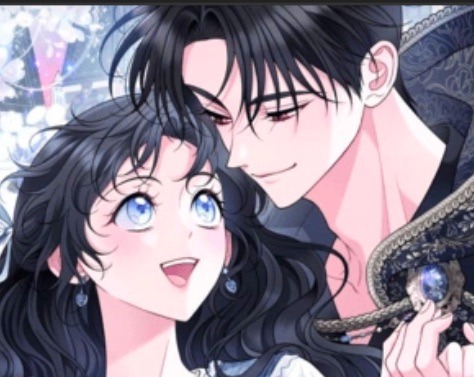
#〝 𝓬𝓾𝓫𝓬𝓱✩𝓽𝓼 ₊ ࣪ ㅤ ꣓ㅤ#they they they :c#see i was pacing slowly through this but suddenly i got hooked . like i feel like i fishie takin' a bait !#he ! ! wants that cookie SO damn bad it's insane . good for her .. good 😭😭 for 😭😭 her 😭😭 !!!#the way the story is pacin' though ?! oh my gosh (⌯︎¤̴̶̷̀ ᴗ ¤̴̶̷́⌯︎)✧ i do love how the story is turning out ! i think there was only#three other manhwas i've read where the transmigrated fl soul has to dwell and fully settle into the possessed body#but i adore how this one goes about it because it's known to the ml immediately! which always been a pet peeve of mine#like the villainess was doing heinous things ?! and suddenly shes like (⸝⸝•ᴗ•✿) and you just think she woke up the right side of the bed ??#not to mention leniel is fan service.. he's so prettie ⸝⸝⸝ᵒ̴̶̷̥́ ᵕ ก ̀⸝⸝⸝ vv eye candy i love him and his character!#but not as much as giselle .. i feel a kinship with her ૮꒰ ིྀ ⍝ ⍝ ꒱ა it's really immersing me inside this manhwa cause of that sgjsjsks#i wanna draw argenti and i using them as reference!:!:'s the way leniel treats her makes me >///< and it's not even me !#i want their love to progress even more !!!! 。°(°¯᷄◠¯᷅°)°。 why did i read this so early !!!!! cliffhangers my belothed !!!!!#but so far .. 8.5 / 10 there's some aspects that make me wonder how the story will play out :o
14 notes
·
View notes
Text
Anime I Watched This Fall
My first semester of college is officially over and the December holidays are upon us! I hoped to make one of these posts sooner, but I have been incredibly busy with schoolwork. Now that things have slowed down, let’s take sometime to reflect on things I’ve watched.
These anime are listed in chronological order and encompass everything I’ve watched from 9/1/2020 - 12/15/2020
Like always, they will be rated on a 1-10 scale; 1 meaning complete garbage, 10 meaning masterpiece. I will offer my thoughts on what I did/didn’t like about each show!
1. The God of High School - 6/10

Despite the stellar animation from MAPPA and my high expectations, I was really disappointed by how this series was treated. Most of the story’s crucial elements were handled poorly. I finished this series feeling more confused about the plot than when I first began. The power system is really cool, but poorly explained. More time should have been spent on exposition and world building for this series, instead the fights were given the most screen time.
2. Doukyuusei - 7/10
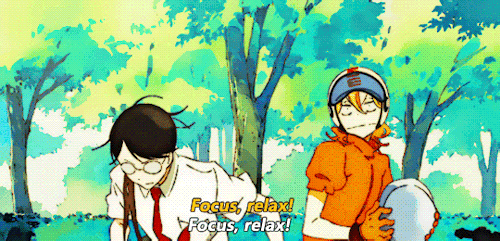
I really liked the style of Doukyuusei. Granted, this was another movie I chose to watch primarily because of the hype surrounding it. The dynamic between Kusakabe and Sajou is an interesting one, and I also enjoy how the movies different acts were separated by the seasons. However, there's nothing that really sets Doukyuusei apart from other romance movies, its a little generic. Still, I enjoyed it nonetheless.
3. Re:Zero kara Hajimeru Isekai Seikatsu 2nd Season - 8/10
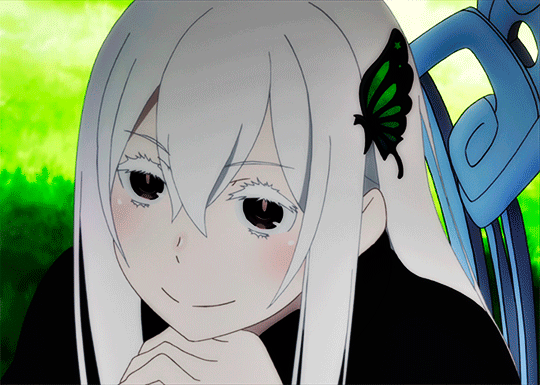
My opinions on Re:Zero’s second season are biased. This was, by far, the sequel I was most hyped for during the summer/fall anime season. I was so happy to see the story’s continuation and I’m looking forward to the season’s second part coming sometime in January. Re:Zero is one of my all time favorite series because of the way it handles it characters and power dynamics. I also really enjoy the show’s psychological aspects. If you haven’t already, give Re:Zero a try!
4. Saint☆Oniisan (Movie + OVA) - 8/10

This was a wonderful comedy. I wasn’t sure how the subject of Jesus and Buddha living together would be tackled, but it was handled wonderfully. I was laughing for pretty much the entire movie. I love the art style and little references to both Buddhism and Christianity, plus the incorporation of Japanese culture. Saint Oniisan is a bright comedy, with two eccentric main characters. If you like a show that doesn’t take itself too seriously, and need a good laugh, I can’t recommend this more.
5. Clannad: After Story - 10/10

Never, while watching anime, did I cry as much as I did while watching Clannad: After Story. I didn’t realize how much I related to Okazaki until I saw him grow up in After Story. I was left sobbing, especially after episode 18. I still, to this day, cannot listen to the Dango song without tearing up. The original Clannad is nothing special, but the continuation of its story its something heartfelt, emotional, and down-to-earth. I love Kyoto Animation with all my heart, and Clannad made me appreciate everything the studio has done just a little bit more. Thank you Clannad, for reminding me about the kind of person I strive to be.
6. Nakitai Watashi wa Neko wo Kaburu - 5.5/10

The art in A Whisker Away was beautiful. The story itself, however, is nothing too enjoyable. I found it difficult to like our protagonist or her love interest. Nothing about this movie is inherently memorable. The emotional climax came far too early which made the second half of the film seem long and drawn out. All in all, the movie has a wonderful concept, I just believe it could have been so much more emotional than it was. When I watch a move, I like to empathize with the characters. It’s difficult to do when the characters aren’t given the proper exposition to be empathized with.
7. Shikioriori - 6/10

This is less of a movie and more of a collection of short stories. Flavors of Youth is something you shouldn’t watch on an empty stomach, all of the food looks incredible. The same cannot beside for the rest of this feature. The stories themselves seems heavily clichéd. Much like A Whisker Away, the initial premise is intriguing, but the execution results in something that comes across as trying too hard and carries no emotional weight with the viewer. If you plan on watching, pay more attention to the artwork and animation than the actual plot. You won’t be missing anything.
8. Vinland Saga - 7/10

Vinland Saga helped me get out of the rut that Clannad: After Story. Not only does this show have a great story, its action packed with lots of interesting fights. I especially enjoyed all the Nordic history embedded within the show. Its really unlike any of the other historical anime I’ve watched. I will say, it’s gory. But, compared to all the other things I watched this time around, I finished this series the quickest. Its good, its graphic, its fast paced!
9. Mononoke Hime - 7/10
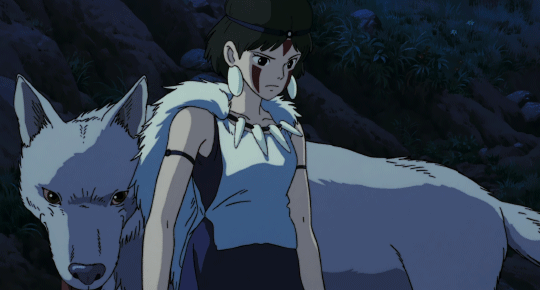
It’s ironic considering how much anime I’ve watched that I have yet to watch all of the most classic Studio Ghibli films. Princess Mononoke is grittier than most other Ghibli films I’ve seen, but it’s message is positive and its characters are wonderful. I can’t really speak ill towards classics like these. I guess maybe my one complaint is that this movie could’ve been a faster pace. Other than that... I really enjoyed everything Princess Mononoke offered! I understand why it’s so popular.
10. Howl no Ugoku Shiro - 8.5/10

Can you believe it took me this long to finally watch Howl’s Moving Castle? Me neither!! This movie is so endearingly beautiful. I loved every second of it, from the characters to the soundtrack. So many iconic things come from just this one movie. I would like to take this time to thank my best friend for reminding me that Studio Ghibli films are wonderful! Thank you for watching this with me, I loved it! All in all, I regret not watching this sooner!
11. Toradora! - 6.5/10
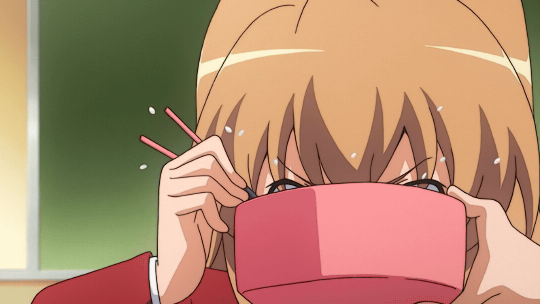
Toradora took me a while to finish, just because I lost interest about halfway through. But, I powered through it, and ended up really enjoying the show! I’m not the biggest fan of the ending, but that’s just a personal preference. Somehow, this show also made me cry? I’m not entirely sure why because Toradora! is probably the thing farthest from sad. Apart from the show’s dull slice of life moments, it was super cute! A much needed light-hearted romance.
12. New Initial D Movie: Legend 1 - 5/10

Full disclosure, this is the only thing related to Initial D that I’ve ever watched. My band and I watched this expecting to hear some of that iconic Initial D music, itself all we got was a mildly confusing story about different types of cars. It was cliché and frankly a little boring. Although, I am still considering watching the original Initial D just so I can hear the music in the way it was original intended. I’ve got no other opinions on this movie. It’s best not to watch these movies without the context from the rest of the franchise.
13. Uchuu Patrol Luluco - 7.5/10

I didn’t really understand why people enjoy studio Trigger so much until I watched Space Patrol Luluco. I loved all the fun references to other studio Trigger works. I loved the humor, and I loved all the bright colors. The animation was extremely high energy, and the art style fits the show’s premise. Each episode was only 12 minutes long so it was a super quick binge. If you’re looking for something quick, light-hearted and comical, this is the perfect show to watch.
14. Orange - 7/10
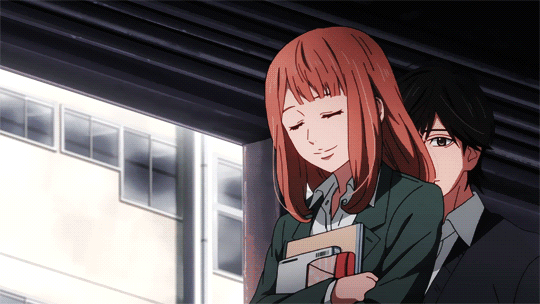
I owe a big thanks to a tumblr mutual for recommending this show to me! This holds the honor of making me cry by episode 3! I honestly did not expect the subject matter of this show to be as dark as it was. Usually when I see the genre ‘shoujo’ I do not associate it with a love story like that of Orange. The heavy subject matter made it a little too close to home for me, but I still really enjoyed this series. It reminds me off all the good times I had with my friends in high school, and of all the regrets I carry with myself to this day.
15. 3-gatsu no Lion - 7.5/10

March Comes in Like a Lion is another show that was a bit of a slow burn for me. Each episode left me feeling emotionally drained, so I had to take a lot of breaks while I was working on watching this series. Shaft, the studio behind this anime, holds a special place in my heart because I loved their work on the Monogatari Series. March Comes in Like a Lion is a little different. It’s driving force it is characters, and it was cathartic to watch our main character transform through the entire duration of the first season. I know the show’s second season is much better, so I’ll be starting that soon!
16. Yojouhan Shinwa Taikei - 8/10
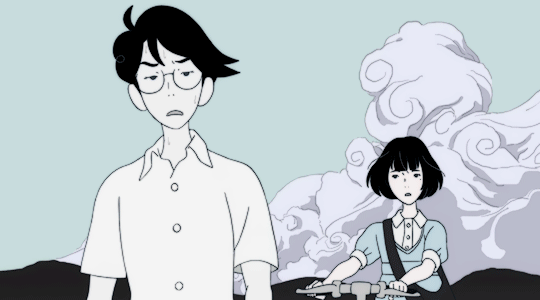
I loved how artsy and smart The Tatami Galaxy is, but honestly I couldn’t watch too much at once cause it would hurt my head. I also couldn’t watch this show while I was tired because the speaking rate is much faster than typical anime. The Tatami Galaxy is so unique for its medium. I loved the different time loops and the crazy animation. The characters were fascinating. The dialogue, although very fast, it also fantastic. There’s an element of humor to this unique story telling, and I enjoyed ever minute of it!
Currently Watching:
Hunter x Hunter - 6.5/10 (As of Episode 30)

I pride myself in having watched a lot of shounen anime, but I was reluctant to start Hunter x Hunter for years because I thought I would find it boring. I was oh so very wrong. Considering great shows like Naruto and Fairy Tail that fall under the same category, I expected Hunter x Hunter to be subpar in comparison. It gets a low score for two reasons. One, the power system was introduced a little too late and now I’m wondering if all the fights post episode 30 will involved nen in some way, shape, or form. Two, its still on hiatus.
Two Cursed Additions For This List
Please to do not let these be representative of my anime taste.
1. Yarichin☆B*tch-bu - 4/10
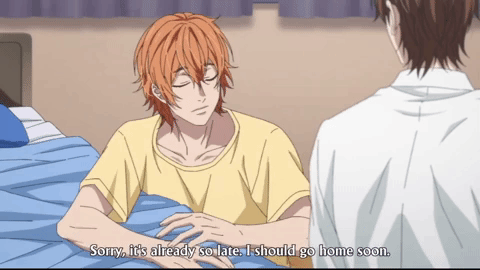
I am a CLOWN for not knowing this was 18+. The only reason I watched this was to see why everyone was talking about the pink-haired boy with the glasses and tongue piecing. I know why now, and I regret it. This was a massive mistake on my part. But hey, at the least the art and ending song kinda slap?
2. Euphoria (Dropped After 1 Episode) - 2/10

If you know what I’m talking about when I say Euphoria, I am so sorry. And no, I am not talking about the HBO series. Seriously, don’t google this. Don’t watch this. Don’t interact with anything related to this. You’re probably wondering, “Then why did you watch it?” I did not watch this willingly. You see, I have a very bad habit of starting anime and then taking months to finish them. I made an ultimatum with a friend, lost, and then was forced to watch this a punishment. Not a fun experience. I’m very glad there are no GIFs of this on tumblr...
#the god of high school#goh#god of high school#anime recommendation#doukyuusei#classmates#rezero#re:zero#rezero season 2#saint oniisan#saint young men#Clannad Afterstory#clannad#nakitai watashi wa neko wo kaburu#a whisker away#shikioriori#flavors of youth#vinland saga#mononoke hime#princess mononoke#Studio Mappa#studio ghibli#howl no ugoku shiro#howls moving castle#toradora#initial d#uchuu patrol luluco#space patrol luluco#orange#orange anime
276 notes
·
View notes
Text
Crash 4 Review/Drabble
Just finished the main story mode, these are my thoughts:
Gameplay:

I'm not the kind of guy who picks up on minute differences in gameplay across games, so I'll say this much - Crash and Coco were a joy to play as; they felt pretty much how I remember (or imagine) them to be, so I have no complaints there.
As for Cortex, Tawna and Dingodile, I could probably take them or leave them. I think a symptom of me being somewhat disheartened at playing their levels was due to the levels being so punishing (see Level Design), so I expect they would have been fine in a more forgiving game. Either way, they're good - but not as good as Crash/Coco, and I would have just as happily played the game without their levels.
It's about a 7/10 for me - high for Crash and Coco, subtracting a little for the other three and some of the punishing levels.
Level Design:

Here's where it gets tricky. I both appreciate and dislike the level design for the same reasons (hear me out) - I appreciate how challenging it is, but it doesn't fill me with the desire to go back and get those gems/crates. I think this is more down to the levels being so long than anything. If they were shorter levels, broken up into 5 or 6 levels per hub rather than 2 or 3, it'd be easy to jump in and replay them - end up missing a box and decide to do another lap to get it right. But these levels being 10+ minutes long really does take it out of you.
In Crash 2-3 it'd be 3 minute levels, maybe 5 minutes at most, and you wouldn't feel winded at the end of them if you missed a box. With 4's levels being so long, and such pixel perfection required, I don't feel encouraged to go back and run through a level because I know how much time I'll spend doing it.
So I appreciate the challenge, but the length of the levels really puts a dent in that appreciation. I'll also briefly mention that the crate placement feels a little 'throw crates at the wall and see what sticks' and bollocky, cheap off-screen placement is a little too common, but in shorter levels that would be easier to live with.
Level design is somewhere around a 6.5-7/10. Great mechanics, but levels are just a bit too long to cope with how aggressively punishing they can be.
Mechanics:

I really like the implementation of some of the mechanics in this game. The Quantum Masks are all equally interesting ideas and they get plenty of time to shine (mostly Akano and Lani-Loli as they're in the game longest, Kapuna-Wa and Ika-Ika seem to get the short end of the stick). The vast majority of their segments are enjoyable, encourage you to think and are challenging without being painful (let's ignore Cortex Castle in that description, that level is pain), and they don't overstay their welcome. They blend nicely with the existing gameplay.
Another thing that blends nicely is the rail grinding; it's a nice change of pace, though I would have liked the ability to speed up/slow down so it felt less automated.
I would maybe say that some of the other new abilities that made it in, for example the ropes, felt like addition for the sake of addition and went a little underutilized, but ultimately the game's new mechanics feel nicely implemented.
Lands about an 8.5-9/10
Art Direction:

I really love the style Toys For Bob has going right now between Spyro and Crash. I have no issue with it at all, though I found that certain things didn't track as "Crash Bandicoot" to me sometimes. Some character designs were dead on to me (i.e N.Tropy) while others felt a little too far removed (I don't think Coco needed so much clutter, the goggles alone would have been enough). I think this is more symptomatic of 22 years passing in the real world and a different studio helming the franchise than any real issue with the direction itself, however.
Overall I really like it, it'll just take a hot minute to associate with Crash. It's bloody beautiful, they did a great job on it, so that's a 9/10.
Soundtrack:
I have to say from what I heard I was expecting big things from the music, and it did deliver in certain instances - though admittedly this was mainly where leitmotifs from previous games were used, especially in the boss levels. Overall I liked the music, but it had the same issue as Spyro Reignited that it lacked the punch and was relegated to the background and didn't feel as much part of the level as everything else.
The only level I feel like they really went all out in was Off Beat (one of the best levels in the game). The way the music was a huge part of the level felt a lot more impactful to me, and I think it's why that level sticks in so many peoples' minds.
Overall, soundtrack probably gets a 5/10.
Boss Fights:

The boss fights were fine - N.Gin and N.Brio were pretty decent, Cortex 1 felt a little cluttered together, but Cortex 2 did everything much better, so I presume they were holding out for that. They're mostly comparable to Crash 2 and 3 (Brio's is almost a direct life), so I'm somewhat surprised they didn't try to do more with them.
The most disappointing boss fight for me has to be the Tropys. When I saw they only had two hit points between them I felt a little let down - it came across as an anticlimax for each of them to only have one hit each, and they barely even did anything.
Boss fights get a 5-6/10.
Story & Characterisation:

I'll say one thing - a platform game doesn't need much of a story, but when it has one it has to make the most of what occurs within it. I think Crash 4's story is decent, but it had focus in the wrong areas. Certain characters went very underutilised - notably Aku-Aku and Crash himself, while others were a little too much.
There was a point where I was wondering why we needed Dingodile and Tawna in the game when their plot relevance amounted to very little and the Quantum Masks would have benefited from more characterisation with the time that would free up.
The most egregious case of misused characters for me is the Tropys. The strange little narcissistic selfcest they had going on seemed ripe for a lot of jokes and dialogue, but they were only in about two cutscenes together and then they were gone. Much like Dingodile and Tawna, it made me wonder what the point of having a female Tropy was if she was there and then gone again three levels later... but then Tropy prime didn't exactly do much either. Felt like they failed to stick the landing in that area.
I find it especially odd that Cortex was his more campy form from Twinsanity onwards. I could maybe see it if they'd taken the angle that 3 defeats had made him that way, but they present his Crash-1-self the same way. I think it would have been more interesting to have the two contrast rather than be the same.
For me the story is decent, it's just a bit off and mismanaged, and the characterisation doesn't completely track from Crash 3 to this game. That's a 6/10 for me.
TL;DR - it's about a 7/10 if I'm being harsh and looking at aspects individually, while stepping back and looking at the full picture is around an 8/10.
The game was really fun, I loved the challenge, I think some stuff just needs time to set in for me and my score will probably rise.
8 notes
·
View notes
Text
SOUL Review: Does Pixar Animation’s Latest Deliver the Expected Laughs and Tears?

We’ve all become accustomed to Pixar Animation pulling out surprises, particularly when it gets away from the pressure by Disney to deliver a sequel to an already proven hit. It’s become tougher in recent years for Pixar to deliver new and original ideas that connect with people as well as the first few Toy Stories, Finding Nemo, etc. While I probably liked The Good Dinosaur and the recent Onward more than most, I totally can understand this pressure, especially for Pete Docter, now the Chief Creative Officer at Pixar, who now has to deliver a follow-up to back-to-back Oscar winners, Up and Inside Out.
Only knowing the basic premise for Soul, one is still likely to go into it with the highest hopes and expectations. At least for his latest, Docter has a secret weapon in co-writer and co-director, Kemp Powers. That’s a name you might want to remember, because even if Soul isn’t in the running for next year’s Oscars (which I highly doubt) then Powers is gonna be all over the nominations for writing and producing Regina King’s A Night in Miami.
Soul is essentially about a jazz musician named Joe Gardner (voiced by Jamie Foxx), currently teaching 9th-grade jazz while still hoping for his big break as a jazz pianist. It finally arrives in the form of a former student who gets Joe an audition with Dorothea Williams, a legendary saxist. After passing his audition, Joe (SPOILER!) falls into a manhole and dies. He wakes up on an escalator to “The Great Beyond,” but his attempt to get back to earth sends him into “The Great Before,” the area where newborn souls receive their personalities. There, he encounters 22 (Tina Fey), a particularly difficult soul who doesn’t particularly want to go to earth.

At this point, I’m going to give a minor SPOILER warning for those who want to be surprised by some of the twists and turns in a Pixar movie when they finally have a chance to watch this on Christmas Day. You ready? The souls of Joe and 22 do end up making it back to earth, and that’s also where the movie gets the funniest. That’s all I’ll say.
Like so many other recent movies, I chose not to watch the trailer for Soul before finally having a chance to plop down and watch the actual movie. Because of this, I didn’t fully know what to expect other than the basic premise. The stuff in the “after life” is pretty trippy and strange, a lot like some of the stuff in Inside Out, and it’s quite a contrast to the stuff on earth. There are a lot of crazy characters on both sides of things, but the two most enjoyable ones are Terry the Accountant (voiced by the wonderful Rachel House from Hunter for the Wilderpeople) and the Graham Norton-voiced Moonwind Starfire, who has somehow figured out how to span both worlds. (If you want a treat, go to IMDB and see who else is providing voices in the movie. Some may surprise you.)
Without having spoken to either Docter or Powers, I have to guess the latter’s contribution is what makes Joe and the other African-American characters he interacts with feel far more authentic. It also makes the stuff back on earth so enjoyable, especially with the new dynamic created by a twist I will not reveal. What was surprising that one of the things that got me tearing up while watching was how well New York City is depicted in the movie with all its craziness, and honestly? I really miss that New York City right now.

When you have a movie that’s partially about music then you better get people who really know how to use music to bring every scene to life. The filmmakers got Trent Reznor and Atticus Ross, which may seem like a strange choice, since the Nine Inch Nails guys are not exactly known for their jazz stylings. That aspect of the movie is handled magnificently by Jonathan Batiste. Even so, Reznor/Ross’ contribution is equally magnificent, making the “after life” segments sound like Tangerine Dream or something from Carl Sagan’s Cosmos* with all sorts of swirling and ambient synth work. (*Believe me, this is NOT a negative. I love that music!)
No one will deny Pixar’s magical ability to create wonderful endings that leave you feeling all warm inside. Soul is no different in that sense, as I tear up just thinking about it as I write this. It may offer more than a little deep metaphysical stuff that might get lost on the kiddies, it’s inspirational and moving enough that like the best Pixar movies, it will get you feeling quite teary but also happy to be alive.
Rating: 8.5/10
Soul will be available exclusively on Disney+ starting on Christmas Day, December 25. (It’s honestly a shame Disney decided not to hold out for Soul to get a real theatrical release, but at least, this will help offer some at-home holiday cheer next week when a lot of people will need it.)
1 note
·
View note
Text
The Untamed/MDZS Spoiler Review
Book rating: 3.5/5 Drama rating: 8.5/10
This is going to be a comparative review of the novel and the live-action drama. I started with the drama, and watched about 25 episodes (all that were available at the time) before I started reading the book. I finished the book at around the time episode 38 came out.
So both my viewing and reading experiences were directly impacted by me consuming both versions at the same time, which is why I don’t think I can write a review that isn’t about comparing the two.
Overall, I’d say I like the drama better. The main actors’ performances, Xiao Zhan’s in particular, played a large role in that. But neither work was perfect, and each had their respective strong points.
First off, I think I have to make it clear that Wei Wuxian is my favourite character (which is good, since he’s the main character). This is important for this review, as I will take into great consideration how each version treated him, his story and his arc.
I usually separate my drama rating into two: I give a maximum of 5 points for objective quality and 5 points for personal appreciation. But I had to cheat here. The most The Untamed could have gotten with that system is a generous 7.5/10, and that feels somewhat wrong for a drama that made me feel so much.
The Untamed is probably the first longer Chinese drama that I watched where I never felt like there were too many episodes. Even The Rise of Phoenixes and Guardian, which I both love, had filler that could easily have been cut. But this drama was almost never boring and mostly stayed focused on the main characters, and with 50 episodes, that’s really impressive.
Dark Wuxian
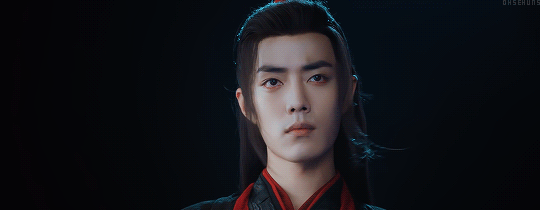
The best thing about the novel for me was probably how delectably gruesome it was. The drama was only PG-13—and I’m being generous—, but the book was R-rated in every aspect. And while the sex scenes weren’t especially my thing (more on that later, unfortunately), the violence was unrestrained in the best possible way.
I love villains. I really do. And while Wuxian wasn’t exactly a villain, every single one of his villainous scenes was just marvellous. I think he has a body count of about 6,000 in this book. Six. Thousand. His Sunshot Campaign moments were some of my favourite, especially the scene where Lan Wangji and Jiang Cheng finally find him after searching for him for three months. The way Wuxian dealt with Wen Chao was extremely gruesome (after all, he made him eat his own legs), but it was sooo satisfying.
(Please don’t come out of this review thinking that I’m a sadist. This kind of events in real life would absolutely horrify me. But this is fiction. And I enjoy my fiction best when it’s ruthless.)
Dark Wuxian, as I’ve been calling him, is definitely my favourite aspect of the book. We don’t get enough of him, but what we get is amazing. Wuxian is a morally gray character. On a D&D spectrum, over the course of this story, he goes from chaotic good to chaotic evil to chaotic neutral. He does good things, he does bad things, he does selfish things, he does selfless things. He’s a complex character.
But it seems that the drama decided that no, Wei Wuxian wouldn’t be a bad person. At all. The only really reprehensible thing we see him do (and even that is debatable) is killing a few dozen Wens and torturing Wen Chao (in a much less gory way than in the book, but I can live with that). From the moment after he comes back to Lan Wangji and Jiang Cheng, he is somewhat… muzzled. The book has him digging out corpses and using zombies to fight in the war, while the drama opted for the much less morally ambiguous “smoke ghosts” that aren’t ever really explained. There were no giggling zombie girls serving him tea either, which I also feel is a shame.

But, then again, I can live with that.
What annoyed me the most, and something for which I cannot forgive the drama, is the Nightless City battle. Forget how poorly executed the whole thing was—I’d given up on this drama’s technical quality long ago. I can accept bad CGI. I can accept incompetent editing. I can even accept odious music. What I will not accept, however, is Wuxian to be absolved of his every fault by making someone else the author of the massacre and the reason for Jiang Yanli’s death. The greatest thing about Wei Wuxian is that is he not blameless. But that’s what the drama made him, and I’m absolutely bitter about it. The drama’s Wuxian doesn’t lose control: control is taken away from him. He doesn’t pay the price for his overconfidence. Jin Zixuan dies at Qionqi Path, not because Wuxian’s instincts and PTSD get the better of him and make him lash out like a cornered dog, but because someone intervenes. His sister dies, but it’s not his fault. And this is really frustrating me.
The book asks this question: Can someone who does bad things be a good person?
But the drama doesn’t, because the drama doesn’t allow Wuxian to be bad.
Also, we’re supposed to accept that Su She was talented enough to overpower Wuxian at the technique that he himself invented? And without owning the Tiger Seal? You’re kidding me, right?
Storytelling and Authenticity
One of the major changes in adapting the novel to live action was the decision to spend 60% of the story in the past storyline, something the novel was very concise about. The events presented in both versions are generally the same, but the drama greatly expanded on the material that it had, and let me say, this was the best thing they could have done. Making most major characters meet at the Cloud Recesses? Genius move. The characters had time to build relationships, something they didn’t always have in the book. It was necessary, notably, to establish a connection between Wei Wuxian and Wen Ning and Wen Qing before the YunmengJiang massacre, so that the rescue wouldn’t come out of nowhere, something it kind of did in the novel. The relationship between the three Yunmeng siblings was explored in detail, making their later tragedy several times stronger and more painful. Though Wuxian stayed the main character the entire time, the drama also gave a POV to other characters, most notably to Lan Wangji, which was a great improvement to the book, where Wangji is a POV characters for maybe two scenes. While I’m never a fan of not having Wuxian’s prettiness on my screen, we do needed to see scenes like the attack on the Cloud Recesses or Wangji’s punishment with our own eyes. Getting these moments through exposition only would have made for weaker storytelling.
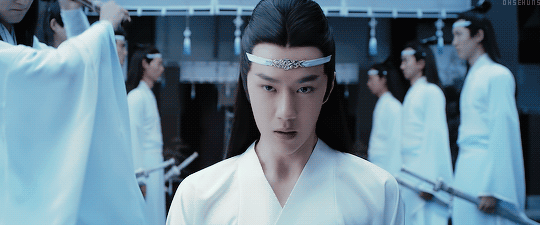
And weaker storytelling was what we unfortunately got with the novel. This is not the right story for a one protagonist only third person limited point of view. Especially when that one protagonist is dead for 13 years, 13 years during which many things happen. Wuxian gets reincarnated, and now needs to know what has been going on when he was dead. Being limited by the narrative style that she set herself, the author was forced to deliver the exposition in huge chunks through the Empathy spell, occupying several chapters each time and thoroughly boring me in the process. This could have been delivered organically with additional POV characters, but the book went the route of the exposition dump.
To be fair, similar exposition dumps are also there in the drama. But they do not feel as much out of place, as the drama made a point to show us scenes with and about the concerned characters beforehand, Jin Guangyao in particular. He was an already well-established character long before he became a major player in the story. Which certainly wasn’t the case in the book.
Something that is easier to do on screen than on paper is the everyday gestures of the characters. Things like Jiang Cheng rolling his eyes at everything that Wuxian does, Wuxian holding his flute Chenqing the same way one would do a sword, the Yunmeng bros playfully hitting each other at any given time, Wen Ning looking at everything with puppy eyes, the ducklings junior disciples using exaggerated fighting stances, Wuxian and Wangji’s eyes crossing every time one of them decides to do something.

You can, technically, put all of these, every instance, in a book. But by writing something, you draw attention to it. You not only make it important, you also make your main character notice it. Which is why writers don’t include every single move their characters make in their book, since most aren’t necessary to the story, would feel repetitive and would distract the reader, or would make the protagonist more observant than they should be. The beauty of film, however, is that you can include these details, as much as you want, without directly drawing the viewer’s attention to them. There are many ways to do this; wide or crowded shots are some examples. These seemingly unimportant details were extremely useful in accomplishing what seemed to be one of the drama’s main objectives: they made the whole thing feel sincere. Character quirks and background interactions work wonders at making you feel like the people on your screen are real and not just played by actors. The relationships between the characters felt so much more real and made me feel so many things that the book didn’t. While I wouldn’t go so far as saying that the book characters felt stale or artificial, the drama definitely added another layer of authenticity.
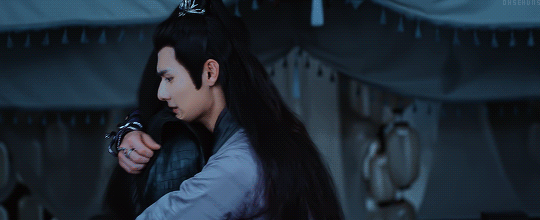
The drama was better at portraying Wuxian’s conflicted emotional state in the events from his return from the Burial Mounds to the Nightless City battle. Of course, it’s to be expected, as the drama spent way more time in the past storyline than the novel did. But by deciding to spend more time with the Jiang siblings, it was also able to depict the way Wuxian’s behaviour changed and how his new physical weakness affected him in a way that wasn’t present in the book. Wuxian doesn’t possess a golden core any longer, and he doesn’t want anyone to know about it. But there are things he cannot fake. Two scenes in particular come to mind. In the first, Wangji attacks Wuxian suddenly, and after barely blocking a few blows, a shocked Wuxian just closes his eyes and waits for the sword to kill him. He used to be one of the best swordsmen, but without any spiritual energy, he now knows that he cannot win a sword fight against Lan Wangji. So he closes his eyes and accepts his imminent death with a painful expression on his face. In the second scene, Wuxian tries to reconcile with Jiang Cheng after an argument, but his brother shoves him the second he touches him. Wuxian falls on the ground, and stays there. The look on his face is a combination of shock and hurt, as he comes to the realization that even playful fighting with his brother is now out of his grasp.
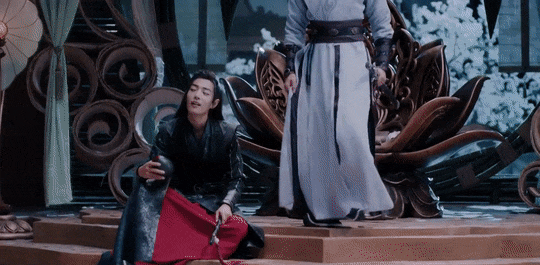
These scenes were a great addition by the drama. Not only did they succeed in adding tension to the characters’ relationships, they also successfully teased Wuxian’s lack of golden core. In the book, this reveal doesn’t entirely come out of nowhere, but you also really needed to pay attention to every detail to guess it. The drama plays a different game: while it is still perfectly possible for less attentive viewers to be surprised by the later reveal, the real emotional pull of the subplot has now become “When will the people who love Wuxian discover the sacrifices that he made?” The fact that the mystery is easier to guess for viewers simply manages to make them more invested in the eventual reveal and how it will affect the characters. And the reveal itself is… *kisses fingers* delicious.
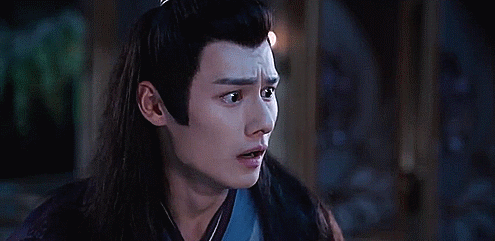
Adaptations Are Hard
In adapting the book, the drama succeeded in many things, several of which I’ve already mentioned. But too many times to count, it also failed to stand on its own.
This isn’t a drama that was ever going to be 100% faithful to its source material. Because of China’s censorship laws, it had to change a lot of things to be able to air. Of course, the gay romance was turned into a bromance (although it didn’t dupe anybody). All the R-rated content was turned into PG-13 appropriate. Undead Wen Ning was made kind of alive in the drama (reminding me of how Chu Shuzhi was a zombie in the Guardian novel but a perfectly alive dude in the drama). Most walking corpses were replaced by black shadows, and were only used by villains. (China really doesn’t like undead characters, guys.) It has been brought to my attention that Wuxian’s toned down evilness may also be a result of adapting to censorship, and if that’s the case, it makes me both more annoyed and more understanding of what the drama did.
However.
When you change something from the source material, whatever the reason is, you have to think about what the implications of your changes are. Which the scriptwriters of The Untamed clearly didn’t.
“Wei Wuxian has been killing indiscriminately since the Sunshot Campaign!” No he hasn’t.
“I’ve fought 3,000 people before, I can take 3,000 of you now.” No you didn’t.
“Sect Leader Jiang, don’t forget that one of the main powers that surrounded the Burial Mounds was you.” That siege never even happened.
Over and over, the drama changes things from the book but doesn’t adapt its later scenes to fit those changes. This results in a succession of lines that feel out of place and incongruous.
In a similar way, they have Wuxian be reincarnated into his old body instead of into Mo Xuanyu’s body. And I get it. I understand why. Your lead actor may very well be the best thing about your show, and giving him up midway through would be a pain for several reasons. BUT. They kept the whole thing about people not being able to recognize Wuxian until the Koi Tower sequence when he unsheathes Suibian. Even though he has the same jaw, the same hair, the same clothes, the same voice, the same basically everything that he had before his death. I guess the drama realized that pushing this farce with Wangji wouldn’t work, so they dropped the whole series of scenes where Wuxian tries to make Wangji believe that he’s Mo Xuanyu. It still doesn’t redeem how senseless other scenes are. In the book, Jin Ling frees Wuxian after Jiang Cheng caught him because he genuinely thinks that Wuxian is Mo Xuanyu, whom he knows personally and probably doesn’t want to see get tortured. But in the drama, he frees Wuxian because…? Jiang Cheng has seen Wuxian’s face and has stated that it’s him, so Jin Ling shouldn’t have any reason to doubt his uncle.

It’s an adaptation. It’s alright to change things. But guys, the changes have to make sense!
Did anybody proofread the script? Nobody?
The Technical Stuff, or Me Shitting on This Drama for 700 Words Straight
If what you’re looking for is competent filmmaking, then I would suggest you look elsewhere.
But if you want an interesting story, sympathetic characters, poignant relationships, and themes of what is right and what is wrong and all the gray areas in between, then go ahead!
— Me, August 15
So.
This is not well-made television.
Like, at all.
Ok, so the costumes are pretty great. The different clans are easy to distinguish while never seeming cartoonish, the details of each garment are exquisite, and, let’s face it, Wuxian black robes simply stole the show. The weapons were really pretty. Some of the tracks from the soundtrack are actually quite nice. There are a few beautiful visuals. The main leads’ acting was good.
But I’m sorry, I have no more nice things to say.
The cinematographer obviously didn’t know how to frame a shot. Camera angles were often awkward or downright useless. The camera moved amateurishly, enough to bring the production values down by itself. Chinese drama reviewer Avenue X has dedicated a significant part of her Untamed review to the problems with this drama’s photography, and since she knows what she’s talking about way more than I do, I’ll leave a link to her video here: X
The editor didn’t know how to edit a scene. It was mostly apparent during fight scenes, with their weird cuts and incessant fading to black for no reason, although I don’t think that I could call any scene of this 50-episode drama “well edited.” Even my favourites. The best ones are just passable.
The editing and cinematography aren’t necessarily bad because of a lack of budget, which we know was a problem with this drama. You can make simple but great content with a small budget. No, they’re bad because the people responsible were not competent.

The two directors themselves don’t have the best track record. The Legends and The Plough Department of Song Dynasty are not well-made dramas in any way. Even Secrets of the Three Kingdoms, on which director Cheng Wai Man worked, was great because of its script and its characters but was brought down by its underwhelmingly average technical craftsmanship.
The sound mixer didn’t know how to juggle the diegetic music and the soundtrack. You know, when you have a main character who fights with a flute, maybe, just maybe, don’t use the tracks from the soundtracks that have flute in them in his scenes. There are many points during the drama where I could hear flute music but had no way of knowing whether that music was diegetic or not, if Wuxian was really playing or if it was part of the soundtrack. Wen Chao: “The flute! The flute! Is it the flute?” Wen Zhuliu: “It’s not. It’s the sound of the wind.” [Meanwhile in the background: flute music.] At this point of the story, Wen Chao is clearly deranged and Wen Zhuliu acts as the voice of reason. However, as the audience, we can hear the sound of a flute. Is it part of the soundtrack? Is Wen Zhuliu in denial or lying to Wen Chao? Is Wuxian playing for Wen Chao’s ears only? There was no need for this scene and others like it to be so confusing.
Most of the secondary actors didn’t know how to act. Xiao Zhan and Wang Yibo were mostly great, particularly once they got used to each other better, and I can name a few actors whom I think did a really good job (Xuan Lu who played Jiang Yanli and Liu Haikuan who played Lan Xichen) but most others were passable at best and horrible at worst.
The VFX artists were just lost all the time. Though I will say that the black shadows created by Wuxian usually looked pretty cool. But they had neither the time nor budget to make this CGI-heavy show seem realistic in any way. Is this a surprise? No. I’m used to Chinese web-drama CGI by now. And I actually appreciate that The Untamed made some efforts to have practical effects when possible. They still looked bad (that giant dog was absolutely terrible), but they could have been so much worse if they had been computer animated. At least they tried.
We Need to Talk About Wangxian, I Guess
The drama’s version of Wangxian is amazing. It’s soft and romantic and heartfelt and authentic. And the fact that it’s technically supposed to be a bromance doesn’t take anything away from it. Nobody in their right mind watches this show and thinks, “They’re just friends.” Where Guardian still tried to (unsuccessfully) pass Weilan as bros, the people who made The Untamed were all *wink wink* with the entire relationship: having Wuxian and Wangji call each other “soulmates” and gaze at each other like the two idiots in love that they are, holding hands, being overprotective, and even including a damn montage of them falling in love. (How this drama still hasn’t been cancelled in China is an absolute mystery to me.)

Book Wangxian is… something else.
In the drama, Wuxian and Wangji become friends rather fast. And while Wuxian still has some moments when he believes that Wangji is there to put him down (“Lan Zhan, I’ve always known that we’d end up in a fight to the death”), he mostly understands that they’re friends. Book Wuxian, on the contrary, still believes that Wangji is out to get him well into the present storyline. And let me be clear: both versions work. They carry very different emotions, but they work. Until we get to the romance.
Because in the book, Wangxian kinds of happens out of nowhere.
In the novel, Wuxian suddenly goes from “Lan Wangji hates me and I need to get away from him” to “Is homosexuality contagious” to “I really wanted to sleep with you!” (in front of his damn nephew, may I add), and that’s fine, in theory. But the transitions in between those changes of heart aren’t really there. 99% of the story is told from Wuxian’s point of view, and I still came out of the book not really knowing why he likes Wangji. That’s kind of a problem.
And then there’s the sex scenes. Oh, the sex scenes.
It would be an exaggeration to say that they sex scenes of the book ruined Wangxian for me, but they certainly did nothing good for the ship in my heart.
It’s not really on brand of me to talk about these things in detail, so I’ll be brief: there is a consent issue with pretty much every single sex scene. In the very first, Wangji is inebriated and cannot consent. The very worst one, which is part of the extras, is clearly a rape. A dream rape, sure, but a rape nonetheless. And the book treats it like something, I don’t know, exciting? So yeah, after finishing the book, Wangxian was making me uncomfortable. The show’s absolute sweetness made it better, but I still have a sour taste in my mouth.
Conclusion
After this review, you may be thinking, “Wow, she really doesn’t like either the book or the drama that much.” But this is just harsh love. I have an eternal soft spot in my heart for this story. To quote my own tweets:
“I have to hit pause every 30 seconds because I love Wuxian so much my heart hurts.”
“it's so good
i wanna cry”

74 notes
·
View notes
Photo
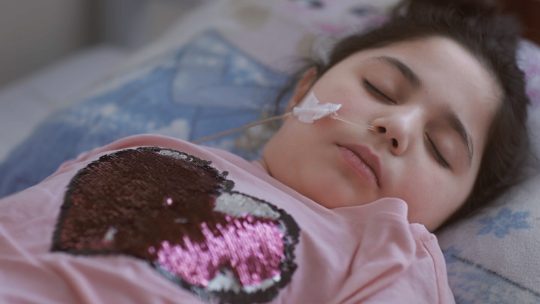

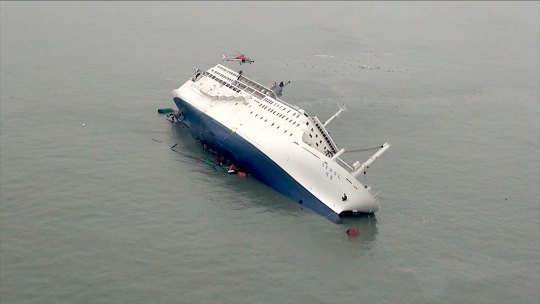
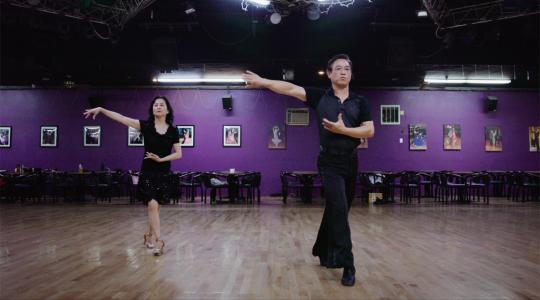

Best Documentary Short Film Nominees for the 92nd Academy Awards (2020, listed in order of appearance in the shorts package)
The Academy Awards may be finished, but I haven’t yet completed my annual tradition of reviewing all of the nominated short films for this year’s ceremony – this omnibus review will do the trick. Thankfully, the Oscars will revert back to their traditional last Sunday in February date next year (at least until 2022).
For the first time ever, I write an Oscar-nominated short film package review with a bias and – if you wish to phrase it – a conflict of interest. As a member of the Viet Film Fest 2019′s Curatorial Committee, I helped select Walk, Run, Cha-Cha for the film festival’s selection in early October. I am not at all affiliated with the production itself, but as a Viet Film Fest selection (a unanimous selection, mind you) I couldn’t help but feel proud of the film’s success.
Also, give these five films recognition for their fantastic titles.
Life Overtakes Me (2019, Sweden)
First identified in Sweden in the 1990s, Resignation Syndrome sees a psychologically traumatized child entering a catatonic state that could last for weeks, months, or years. It is considered a dissociative disorder that has only been affecting refugee children and adolescents who are going through an extended period of immigration limbo. Since Resignation Syndrome’s identification in Sweden, cases have been reported among refugee children who had been transferred from Australia – where asylum has been divisive to the nation’s politics for decades – to the now-defunct Nauru Regional Processing Centre (many refugees, hoping to be Australia-bound, are still on Nauru and statistics on how many children have Resignation Syndrome are not accessible) and in Greece. Life Overtakes Me, co-directed by Kristine Samuelson and John Haptas for Netflix, concentrates on the plight of Sweden-residing refugee children with Resignation Syndrome and their families. Many of these children in Sweden are from across Eastern Europe and the Middle East – some hail from as far as China’s Xinjiang province, home of the persecuted Uighur minority.
One doctor in the film describes the state of one child to her parents: “Your child is laying here like Snow White because everything is so terrible around her that this is a way of protection.” Life Overtakes Me, however, never adjusts its focus from explaining Resignation Syndrome. This is where it frustrates: neither the families nor their children are framed as being anything else than either the family of a child with Resignation Syndrome or a child with Resignation Syndrome. There is no discussion about the contemporary European migrant crisis, nor on the medical progress on understanding the complexities of the disorder and how to treat it. After depicting a child with Resignation Syndrome and another one, Live Overtakes Me has expended its see-it-to-believe-it aspects, becoming a tedious watch.
My rating: 6/10
Learning to Skateboard in a Warzone (If You’re a Girl) (2018, United Kingdom)
There have been a number of nominees (and winners) in this category in the last decade that sometimes feel like a shameless plug for a non-profit providing wonderful things for an underserved group abroad. Carol Dysinger’s Learning to Skateboard in a Warzone (If You’re a Girl), an A&E film, at times falls into that trap. The film documents Skateistan, a Kabul-based non-profit established in 2007 that administers a school for boys and girls (41% of the students are girls; the film will exclusively concentrate on the girls because of how contentious educating females was and is in Afghanistan), as well as the skate park attached to the school. In conjunction with their typical school subjects, skateboarding teaches the girls courage, resilience, and creativity. The film juxtaposes their beginners’ curiosity – examining closely their boards, playing with the wheels, not prepared to be balanced on a skateboard while rolling along without a teacher’s assistance – with their hardscrabble lives outside the school’s high (for safety reasons) walls.
Though these girls may not be competing in the Olympics (given that skateboarding is a new Olympic sport) anytime soon, the joy that skateboarding gives them is apparent. “I don’t want to grow up, so I can skate forever,” one girl says. If only. This is where Learning to Skateboard (If You’re a Girl) separates itself from the sports documentary/narrative film and becomes profound in a way I have not seen described by others who have seen the film. Similar to the fine and performing arts, sport is a medium of individual expressivity. An entry into ESPN’s 30 for 30 series can describe to a viewer the tactical dominance of the University of Miami’s (Florida) football team; I can also relate how the 2003-04 Arsenal (“The Invincibles”) played teams off the soccer field in becoming only the second team in English history to finish the top division’s season undefeated. But to those who are not engrossed in sport (or do not possess knowledge about the mechanics of a certain sport), it is difficult if not impossible to understand how those aforementioned teams played their games as a form of self-expression. By taking gender, a shade of politics, and Afghanistan’s history, it is easy for any viewer to see how – through skateboarding – these girls can express themselves in ways they could not anywhere else.
My rating: 8.5/10
In the Absence (2018, South Korea)
On the night before April 16, 2014, the Korean ferry ship MV Sewol departed Incheon for Jeju. The next morning, the ferry capsized and overturned. There were 172 survivors, but 301 passengers – mostly high school students who followed the captain’s orders to stay put, even as seawater started flooding the interior – and three crew members perished. The captain and other crew members disembarked during the rescue operation. Yi Seung-jun’s In the Absence documents, minute-by-minute, the actions of the disaster that sealed the fates of survivors and victims alike. Incorporating stock footage and Korean Coast Guard/government/civilian rescue diver recordings, Yi’s film portrays the desperation of the rescuers and the incompetence of those commanding them. The tragedy, from the moment that the crew recognized the danger of the situation, unfolds over several hours – enough time for a government response. Inexplicably, passengers were instructed to remain in place despite their inquires and the office of former South Korean President Park Geun-hye forbade all rescue boats from approaching the ferry until President Park herself gave orders.
Many of the documentaries – in short and feature-length – on the Sewol disaster follow the families of the deceased or the guilt among Coast Guard or civilian rescuers in not saving the victims in time. There are elements of both within In the Absence. Where Yi’s film diverges from those previous entries, however, is in its chronological precision in its first half and how seamlessly it transitions between the personal and the political (the film posits that the Sewol disaster response was a contributing factor to President Park’s removal, even though Park’s impeachment and eventual conviction had nothing to do, ostensibly, about the disaster) in the second half. From the committee hearings investigating the particulars of the government’s disaster response to the night of President Park’s removal from office, In the Absence packs an emotional wallop few documentaries of any length could achieve. One can see, etched in the faces of the victims’ parents, profound relief that someone is being held accountable for the disaster. That relief, though, is forever entangled with the fact that their loved ones are lost to the deep.
My rating: 9.5/10
NOTE: In the Absence can be viewed on YouTube as of this review’s publication.
Walk, Run, Cha-Cha (2019)
Chipaul (or just “Paul”) and Millie Cao were childhood friends in Vietnam (of Hoa descent) in the midst of wartime. During their childhood, they were enamored with American rock-and-roll and other popular music from the West – says Millie: “I love Bee Gees. And I can sing all Carpenters song [sic].” Chipaul’s family, who ran a business, saw the necessity to flee the country because of the Communist Party of Vietnam’s hardline attitudes towards political opponents – the Communist Party’s sins are too many to mention. Laura Nix’s Walk, Run, Cha-Cha, distributed by The New York Times, does not concentrate on war nor the fact that Chipaul and Millie, now married and living in Southern California after finding each other again (figuratively) through dance classes, are among the millions of Vietnamese-Americans – a community of refugees and their children and grandchildren – who have overcome cultural and linguistic barriers to make the United States their home. First and foremost, Walk, Run, Cha-Cha is a love story partially told through their passion for dancing. The film never loses sight of that.
Because this is a love story, there are those who might claim that Walk, Run, Cha-Cha is too slight a documentary short film to be taken seriously. That erases the fact the fact that when Vietnamese-American people or fictional characters are portrayed in Western cinema, they tend to be defined by a short list of tropes: the war-weary victim of war, an ineffectual gangster, or a nerd (this lumps in Southeast Asians with those of East Asian descent). Here, Chipaul and Millie are not defined by their pasts. Their dancing is not some act of overseas rebellion against the current government of Vietnam. Their family get-togethers do not ruminate over how difficult it was to sponsor Millie to become a permanent resident to the United States, but instead contain lighthearted conversations about the music they grew up listening and singing – endearingly a bit off-key – along to. Beyond the film’s requisite interviews, we see them in personal and recreational settings. Though perhaps not the strongest of the year’s nominated documentary shorts, Walk, Run, Cha-Cha flows the most poetically. Its final scene is perfection.
My rating: 8/10
NOTE: Walk, Run, Cha-Cha can be viewed on YouTube as of this review’s publication.
St. Louis Superman (2019)
Bruce Franks Jr. has spent his entire life in the greater St. Louis area. He has experienced firsthand incidents of gun violence (in general) and, following the death of Michael Brown at the hands of a police officer in Ferguson, Missouri. Brown’s death ignited a series of protests in Ferguson and brought to prominence the Black Lives Matter (BLM) movement – formed to call attention to systemic racism (and especially police brutality and racial profiling) against black Americans. In a sort of Mr. Smith Goes to Washington (1939) for this certain context, Franks becomes a community activist in the wake of Brown’s death and is soon elected to the Missouri House of Representatives in 2016. This MTV-produced film directed by Sami Khan and Smriti Mundhra is St. Louis Superman is a tad conventional in its biographical approach. The demands of being a state legislator and a family man are a curious balance to strike, and Franks is obviously not fully prepared – who would be? – to manage the expectations of his newfound role as public servant, father, and community leader.
It is fascinating that St. Louis Superman elects not to dive too deeply into politics, that Franks, a Democrat, highlights gun violence in its totality rather than police brutality towards black residents. Perhaps this is a political calculation, noting that Missouri’s legislature is majority Republican as is its current Governor. The film handles the personal adjustments made between Franks’ legislative career and his personal life, but whiffs – with the exception of the rap battle against a rival candidate for his seat – on juxtaposing how being a legislator invariably affects the nature of his community activism. Where St. Louis Superman succeeds is in its respectful portrayal of Franks as a man still nursing the wounds of having witness his nine-year-old older brother’s shooting death, and how this has driven him to where he is now. Franks, citing his mental health’s deterioration after the deaths of his godson and best friend in 2018, resigned from the Missouri House of Representatives in 2019. His career is a microcosm of the political struggles of African-Americans appealing to the decency of a seemingly unreceptive numerical majority, waiting and pressing the case of equal treatment in the eyes of the law.
My rating: 7/10
^ Based on my personal imdb rating. Half-points are always rounded down. My interpretation of that ratings system can be found here.
From previous years: 88th Academy Awards (2016), 89th (2017), 90th (2018), and 91st (2019).
#Live Overtakes Me#Learning to Skateboard in a Warzone#In the Absence#Walk Run Cha Cha#St. Louis Superman#Kristine Samuelson#John Haptas#Carol Dysinger#Yi Seung jun#Laura Nix#Sami Khan#Smriti Mundhra#92nd Academy Awards#Oscars#31 Days of Oscar#My Movie Odyssey
1 note
·
View note
Text
Grey's Anatomy: Who Lives, Who Dies, Who Tells Your Story (14x07)
Okay, that was undeniably kind of fun. I'll admit I was a little skeptical of the concept, but it all worked out and it made me smile.
Cons:
I will say, the "baby-Izzie" part of this story was a little weird to me. I can understand being sentimental about George, who died, and even Cristina, who left on good terms and is still in contact with Meredith and Alex. But Izzie? It's not like she's trapped in another dimension or something. It's not like she's dead or Alex can never see her again. We get this moment where Alex tells Jo that whenever he thinks of Izzie, he imagines her smiling, and being as happy as he is now with Jo. And I'm thinking: it's great that you've forgiven her for everything, but it's not exactly like she treated you well, and then she just abandoned you. I'm not sure that I like the romanticizing of Izzie Stevens going on here.
So far, I'm profoundly uninterested in DeLuca and his ex-girlfriend, with whom he seems to be starting things up again. It's just that DeLuca is kind of really boring, and I know nothing about this girl, and I don't feel invested. So. There's that.
Pros:
The basic idea here is that patients come in to the emergency room after a roller coaster accident, and they are eerily reminiscent of George, Cristina, and Izzie. This makes for a lot of good quality nostalgia and screen-time for Alex and Meredith, the other two original interns. I liked that the people playing these look-a-likes were not trying to do impressions of these characters, but were just similar enough that the memories could come forward. I've always admired Grey's Anatomy for keeping its past as an integrated part of the story. When a character leaves, their impact on the rest of the characters is still potent.
I particularly liked the moment at the end when Alex and Meredith go down to the hallway where they used to hang out as interns. Cristina calls, and the three of them can bond together in memories of their past. So sweet! Alex and Meredith have long been one of my favorite relationships on this show, so I was glad to get to see some material with them. The joke about roller coasters at the start of the episode was just vintage Alex and Mer. Love it.
The other big plot thing going on is that Meredith is up for the Harper Avery, but she ends up missing the actual ceremony because she's in surgery working on baby-Cristina. The rest of the hospital arranges to have the ceremony live-streamed, and Meredith gets to watch as Catherine Avery announces that Meredith has won. Jackson gives a beautiful speech as he accepts the award in her honor. He talks about all of the loss she has suffered - Lexie, Derek, and her mom - and how she turns that loss into a drive to help save lives. We see a gallery full of her family, including Maggie, Zola, Owen, and Amelia all smiling down at her and clapping, and we see the image of Ellis in that crowd, clapping along with them. It's all made the more potent because Meredith is wearing the famous ferryboat scrub cap, so we know that Derek is with her as well.
In subplot news, Miranda is pissed off with Ben about the firefighter thing, and honestly, I don't blame her! Ben has always been an adrenaline junkie, and I like the fact that this current plot is forcing that aspect of his personality out into the open. Maybe it'll lead to a final confrontation and a realization of who he wants to be. We shall find out.
We've also got Arizona being very nervous about Sofia coming home. This was really sweet, because she ends up reminiscing about Mark, and thinking about what he'd tell her if he were there. He'd tell her to relax, to let Sofia get three different kinds of ice cream, and that everything will work itself out. Indeed, as the episode ends, we see Sofia arrive. She misses her other mama, but she seems excited about the ice cream prospect! I always say that plot threads in this show that feature the kids are a little silly, but for whatever reason, this really worked for me. I liked seeing Arizona anxious about being a full-time mother again. I wonder if this will lead to increased mentions of Callie, and if we'll figure out what happened that made Sofia want to move back home.
Speaking of the kids, Maggie gets a pass from my eternal wrath this week, as her function in the plot was basically to be really excited for Meredith, and hang out with Zola. Zola is adorable, and it was really cute and sad when she talked about missing her father. Zola actually helps Maggie a bit with her own grief over her mother by saying that her mom will always be with her. This is of course echoed when we later see Ellis Grey's image clapping for Meredith. She's standing near Maggie, her other daughter who she never knew. Kind of powerful stuff, if you can stomach the cheesiness!
I managed to keep this review a decent length, so let's not ruin that with a lengthy wrap-up. I thought this was a lot of fun!
8.5/10
#review#grey's anatomy#grey's anatomy review#greys anatomy#greys anatomy review#grey's#greys#grey's abc#greys abc
1 note
·
View note
Text
captain marvel: a review
it's not a bad film, surprisingly. it does perfectly fit that "marvel formula", which can be annoying for those of us that want something fresh and new from the studio, but it's still enjoyable, so i have to give them that.
i really enjoyed the opening of the film. i forget the planet names, but the whole kree universe was very interesting to me. it almost felt like a futuristic dystopia, and a very cool world to explore. disney sure has a lot of theme park potential on their hands with this land, wakanda, and asgard. (though they probably wouldn't want to develop a whole land based on the kree, after that ending.)
the way carol came to get her memories back was also interesting. at least, i liked how it took a lot of time. i really expected the film to be your standard origin story, starting with her time in as a pilot, going to when she gains her powers and leaves earth, and her return. it was still kind of a linear story, but the flashbacks being scattered throughout helped make the film feel unique and kept me more engaged.
i also really loved the twist regarding who, exactly, was the villain in the film. i haven't seen all the mcu movies so i don't know if they already did something like that before - i know wonder woman in the dceu kinda also did a villain fake-out, just a little bit differently - but i thought it was cool. (and it was very satisfying to me bc the revealed not-villain is played by an actor i've come to really like in the past year, and he's played lots of villains in the past, so seeing him as a truly sympathetic character? amazing, brilliant, 10/10.)
when it comes to specific favorite characters, well - talos for sure. i only really watched the film for ben mendelsohn bc i heard such good things about his performance in the film, and i was not disappointed. i really loved his character and i hope to see plenty more of him in the mcu. i also really liked yon-rogg????? i mean, i'm a sucker for a good [redacted], but jude law also did an excellent job playing the role and i wanna see more of him in the mcu too. (honestly, this whole film really just set up what could be an amazing sequel/trilogy, so, like, screw endgame. bring on captain marvel 2 & 3!)
carol was cool too, i won't lie. i don't love brie larson, and i especially don't like what she's been saying on the press tour for the film. it's one thing to want more equality for women, and more diversity, but to just be like "yeah i hate white men"??? that doesn't solve anything. thankfully, the character wasn't like that. sure, she was a strong woman, but she didn't seem to hate men too much as she spent most of the film with fury and, of course, befriended talos in the end (though technically he's not a man, but a male alien).
some other things worth noting that i liked in the film: the music! score was excellent, and there was definitely a fair amount of 90s music which made the film a lot of fun. (it's probably bc i still have mendo on the brain, but honestly? this film and ready player one probably make a nice pair. at least, soundtrack-wise and visually, because 80s & 90s) i especially liked the gwen stefani song that played over the, well, important, idk if it would be considered "big", fight towards the end. people online have asked for more pop songs over fight scenes, and this delivered on that. also, while the cgi in some places looked pretty weak - most of carol flying through space looked very video game-like, and her falling towards earth later on in the film had a brief moment of laughably bad cgi - the de-aging on samuel l. jackson and clark gregg???? incredible. that technology has really come so far. while i generally wouldn't be thrilled if this film became oscar-nominated for visual effects, that one aspect of the film is certainly one to behold.
overall? it was a good movie. not perfect - i have some other, smaller issues that may come up in later posts (i don't feel like going into them right now) - but as i saw an opinion piece say, it's fine to have a female-led film that's not some amazing masterpiece. i mean, not all male-led films are spectacular, so female-led movies don't all have to be either. but don't ignore this film - it's definitely worth a watch! and was a very good kickoff for me when it comes to 2019 films :)
8.5/10.
0 notes
Text
a 2017 recap
When looking back over the year that was 2017, a person could be forgiven for assuming that it might rank up there with some of the worst years in my life. There was turbulence in my personal life after I broke up with my boyfriend of nearly 5 years. I didn’t post any new race PR’s, especially in the half marathon distance (my white whale!). I took two months off of running in the summer and struggled to “get back on the horse” after my 50K. I survived a little car accident that we all know about – that by itself is enough to make 2017 the worst year on record! But surprisingly, I don’t see it that way. It was a great year for many reasons.
I initially met him in 2016, but I got to know my boyfriend in 2017, and we spent a lot of time exploring Kalamazoo together this spring and summer. I could go on and on for pages about how cool and smart and funny and awesome he is! Our relationship has a great origin story that makes me smile whenever I think about those early days. (Who doesn’t love that incredible NEW LOVE feeling?!) I met his wonderful parents and their sweet doggo this year too; I’m so thankful for them and I love spending time with them as well. They played an important role in my hospital experience here in Kalamazoo immediately after the accident. A highlight for the year: I took an amazing week off in March/April with Michael and we visited Sedona; that trip was a game-changer for us as a duo, but was also incredibly soul-refreshing all on its own. We got to spend time with our dear friend Keira, got to see the Grand Canyon for the first time, and did lots of hiking and climbing and general relaxing in a very beautiful place. (Shout out to my amazing grandparents for allowing us to stay at their home while they were away! Our wonderful trip would not have been possible without their generosity.)
I ran some really awesome races this year. My finish times were mostly not great, but the experiences themselves were amazing and I love looking back on them. My running goals are set annually via my New Year’s Resolution, so this year’s goal was to run “nothing shorter than a half marathon.” I tasted the distance bug in 2016 and decided to challenge myself in that aspect of running this year.
February brought the Winterblast 13.1 in Portage, a fun and fast little winter race right in our community that was absolutely freezing cold after a week of temps on the warmer end of things. It was a beautiful day and I ran my heart out after having trained for only six weeks or so, ending with a 2:01. That was the first race Michael attended as my cheer squad, which made the stakes extra high ;)
April was Gazelle Girl 13.1, which I ran for free as a Gazelle Sports Activator. Not my favorite race, but I’m happy to run it and represent GS anytime. This was the closest I came to a PR this year (2’00”). If I hadn’t had to make two (TWO?!) bathroom stops, I probably would have beaten my all-time half marathon PR (1:56, 2015). So close and yet so far. This was the race where my mantras centered around pain: pain is weakness leaving the body, pain means you’re getting stronger, embrace the pain, etc. That really helped me pull through at miles 10-13.
May is Bayshore Month - obviously - my favorite marathon! This year’s Bayshore brought my first-ever black toenails, which are STILL hanging on as I type this. Gonna see how long I can keep those around. My finish time was abysmal, even worse than last year, but at that distance I don’t worry too much about the end result. I’m just proud to make it through till the end and I try to have as much fun along the way as I can. The best part of Bayshore 2017 was seeing Michael around mile 7; he was running the half, so I knew I’d pass him before too long. Scanning the oncoming runners for his face kept me occupied for a few miles, which was nice. We spotted each other and shared a big kiss in the middle of the road, which was everything I dreamed it would be. The guys I was running with got a kick out of it and asked if they could have a kiss from him too 😂
June was the big one... my first ultramarathon!!!! I had been wanting to run one since 2015 or 2016 and decided that 2017 would be my 50K year. It was an incredible experience that I’d do again in a heartbeat. It was also the most physically and mentally challenging thing I’ve ever done. Spending 8.5 hours trotting through the woods on your own gives you a lot of time for soul searching and introspection. I’ve never felt stronger or more capable of doing anything in my life. The sense of accomplishment was absolutely enormous. Just like my first marathon, as soon as I was done with my 50K, I knew that wouldn’t be my last ultra. I immediately decided that a 50 miler was within reach for 2018. Those plans are now derailed by the accident, but I am only pushing it back to 2019!
In July I ran another 13.1 in Kzoo, put on by Run Michigan Cheap on the Kal-Haven Trail. If you haven’t heard of RMC, check them out: they do bare-bones events all over the state, all season long. You can’t beat the price for a great training opportunity or quick last-minute race. That was my first time running on the Kal-Haven Trail and I quickly fell in love with it! My finish time was poor (this was about 4-6 weeks after my 50K and I hadn’t been running a lot) but I had a fun time. It was also my first race in my Altra Escalantes – two thumbs up!!!!
August is Seawheeze Month, yippe ki yay! I made my third annual pilgrimage to the Great White North with my big sis Meghan to run Lululemon’s flagship race in Vancouver. She and I focused on being in the moment and enjoying the sights and sounds of the race. When you travel that far for a race and don’t have a chance at setting a personal best, why beat yourself up about it?! I wanted to soak every detail in, instead of putting on the blinders and missing out on the whole experience. It is an absolute riot, they do an amazing job of organizing it and throwing a huge party all weekend long. Despite my injuries, I am still planning to register for 2018. Michael wants to run it with us this year, and it would be great to have that be my first “real” race back in the saddle.
September was my last race of the year, due to my accident. I signed up for Ragnar MI on a whim in July and it was held the last Friday and Saturday of the month. Running 200-ish miles over the course of two days sounds pretty badass – and it was. I was very out of shape after taking the summer off, but I had three gorgeous/fun segments AND I got the bonus medal for running the hardest leg of the entire relay. Who wouldn’t enjoy a weekend of running through northern Michigan in late summer?! At the time, I didn’t love the experience as a whole, but looking back on it, it was pretty freakin awesome. I would love to do it again in a year or two, but I would definitely choose my own team instead of joining a team of strangers.
As we all know, October brought its own set of challenges. I had a half planned for the 15th and our accident was on the 13th. As Michael says, this is the longest and hardest race I’ll ever run... No race lasts 6 months or a year... But this one does. I am still grappling with a lot of challenges related to my injuries, mostly mental, but overall I hope to emerge from this trial with my head held high, stronger and better than I was before. My goal for 2018 is to try to start running in April, if not sooner. That is the 6 month mark for the accident, and my fractures will be considered completely healed by then. Plus the snow will (hopefully!) be gone and I can start getting outside again. This accident has brought forth a host of issues that I never would have imagined. I am working on myself every single day – all I want is to get stronger and closer to being “normal.” I have to remember that this is “normal” for me right now – but at the same time, I want to challenge that, and push back at it, and reshape it to fit my goals and desires. As for that 50 miler I had planned for June 2018? I WILL complete it in 2019. Keep your fingers crossed that the race is held again in a year and you can see me there!
I am excited to see what 2018 brings for me in terms of physical progress. I am hoping to explore other avenues of physical activity as I creep back towards the running world. Stay tuned for more!
0 notes
Text
Blade Runner 2049 Review
Before I start, I just wanna say that there will be MAJOR SPOILERS from this point. Read at your own discretion.
There isn’t much I have to say about Blade Runner 2049 as an introduction as I’m sure anyone who’s watched BR2049 has watched the original and knows what this film takes off from. The three short films which were also released prior to the film served as a good lead up to the film, especially with how they showed us what happened during the Blackout and the rise of the Wallace corporation. I should, however, mention the important cast members – Ryan Gosling plays the main character Officer K-NUMBERS NUMBERS NUMBERS (or Joe later in the film). Harrison Ford is back as Deckard, and Jared Leto plays Niander Wallace, leader of the Wallace Corporation which has taken over from the now bankrupt Tyrell Corporation in replicant production. Luv is Niander’s right hand gal and is played by Sylvia Hoeks.
I’ll start by saying BR2049 is fantastic – it is filmed spectacularly with fantastic shots throughout the film, particularly the flying car scenes. You get an amazing sense of grandeur as you see K fly between huge buildings and towering blocks, playing into the cyberpunk dystopia aspect very well. Speaking of cyberpunk, the CGI and scenery is by far the best part of this film (like the original BR) and seeing the towering buildings, dirty alleyways, huge holographic advertisements on the side of buildings, futuristic and abstract lighting and décor and so on made my dick twitch. Denis Villeneuve uses a lot of top down and wide angle, almost panoramic shots when any transportation is taking place, so watching K travel in a huge city to over a futuristic protein farm to crash landing in a junkyard is all fantastic to see. The soundtrack is by Hans Zimmer (alongside Benjamin Wallfisch), telling you all you need to know and in terms of acting, well, there are some fantastic performances; Leto standing out to me the most. You feel the abstract, dangerous genius in his performance quite strongly, and I should say Hoeks is great as the remorseless and lethal replicant assistant. Ryan as the main character is great too, able to portray a lot of emotions just from facial expressions as he did a lot in this movie. And I should say Harrison Ford surprised me a bit with his really good performance although it kind of weakens in the final few scenes.
Now is when the BR fan comes out and I get real picky with my negatives with this film and I’ll start with what I think is the weakest (although still great) point of the movie – the storyline. I should say the film really does start off great, but there comes a few parts later on that I personally didn’t find too great. At this point I am just going to assume you have already watched the film (and if you haven’t, stop reading this and go do so) and I’m just going to go straight to the points I want to make.
We see K go through the whole film discovering his past, his true nature and seeing how all the pieces of the puzzle to make him the chosen child – the first ever birthed replicant. So, when some one eyed granny named Freysa, self-proclaimed leader of some Replicant Independence Group/Cult/Clan or whatever (which we get no hint or info on until K gets saved by them) tells him he actually isn’t through some weird dialogue, I’m left a little frustrated. I’ve connected to K throughout the film, seen him make love to his cyberpunk equivalent of an anime bodypillow, lose his job and his mind in the hope that he would carry replicants into a new age of prosperity (highly unlikely but let a man dream), but this old ass woman just tells K “You have been le tricked :^)” and it just brings it all down. No manifest destiny. No Special K. Gran-gran even comes out with some all-inclusive bullshit like “We all wish we were the child, my son”, fuck outta here. And the damn chosen one turns out to be this woman we see for a bit with no inherent bearing on anything locked in some glass room in some building. And we don’t even get the slightest hint that it’s her other that the kid is supposed to a girl. Freysa even tells us the child ‘was dressed in blue before hiding her’ but we see no sign of blue anything when K meets the doctor. It didn’t even have to be blue clothing, anything that would have given us some slight hint as to her origin or who she was in regard to the whole story would have been fantastic. There might, however, have been some hints that I missed out on, making me a huge idiot, and honestly, I can understand in the context of the movie why this might have happened since Deckard went the whole mile in trying to cover up his secret. I should mention the ending with Deckard meeting his daughter and placing his hand on the glass is strange also, given the fact Dr. Ann doesn’t know who he is at first.
This next part is very nit-picky but I would have liked some more detail and exposition in certain parts of the film. BR2049 does not hold your hand and does expect you to piece together some things and that’s good, I like that. My issue just comes from a lack of backstory in certain interesting aspects of the film, such as the Wallace Corporation. Even with the little prequel clip and opening dialogue, the Wallace corporation doesn’t get that much attention. I was wondering throughout the film about the scale of Wallace Corp. operations (off-planet and such), how Niander Wallace came to be, what caused his blindness, how his replicants were created and so on. In the end, you get almost no information on Niander even with how interesting the character is at first and how he is essentially the main antagonist of the film. I’d say this is just an issue of not capitalising on the setting of your film as much as you could, which you see in several films.
Despite the very few grievances I have with BR2049, this film really does transport you into the dystopian future setting with its fantastic cinematography and plays out a solid story. In conclusion, I give Blade Runner 2049 an 8.5 to 9 out of 10.
#Blade Runner#Blade Runner 2049#Review#Ryan Gosling#Harrison Ford#denis villeneuve#cyberpunk#dystopia
2 notes
·
View notes